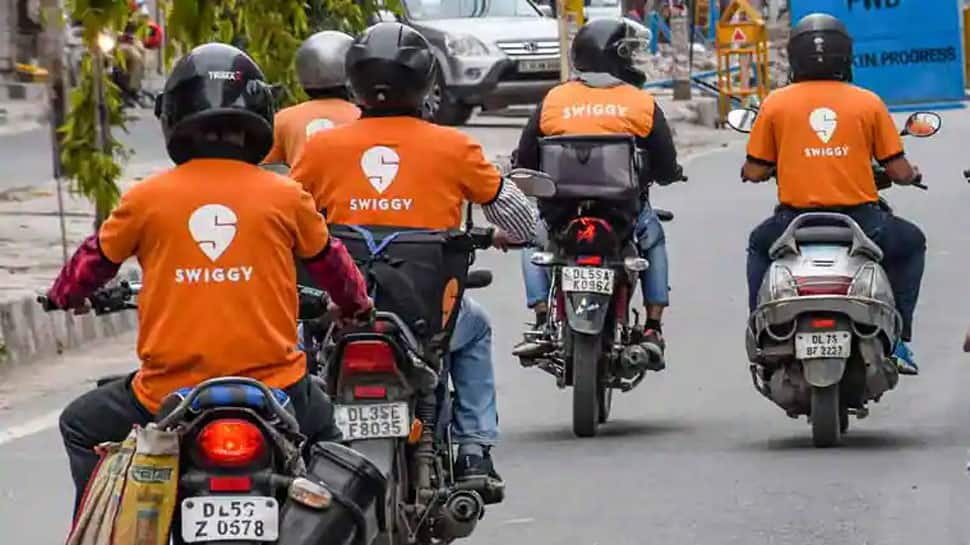Swiggy riders continue strike for the third day over change in payouts

Swiggy riders continue strike for the third day over change in payouts
In Mumbai, delivery executives working for Swiggy have continued their protests for a third consecutive day, causing disruptions in the operations of the food and grocery delivery platform across various parts of the city. These protests are a response to recent alterations in the workers’ rate cards and an expansion of the delivery radius. It’s important to note that these delivery workers are classified as gig workers, meaning they are not on Swiggy’s formal payroll and are compensated on a per-order basis.
The initial protests were initiated by members of the Rashtriya Karmachari Sena in Bandra. However, the demonstrations have since gained momentum, with other groups and individuals joining in. This has resulted in sporadic protests occurring in different areas of Mumbai, which is a significant market for Swiggy’s services. The ongoing protests highlight the challenges faced by gig workers in the gig economy and their demands for fair compensation and better working conditions.
Delivery executives participating in the protests have raised concerns about recent changes to their working conditions. They allege that their delivery radius was expanded from 4 kilometers to 6 kilometers, but their base pay has remained unchanged at Rs 20. It’s important to note that the final compensation for delivery executives consists of several components, including the base pay, which is supplemented by additional amounts based on factors such as the distance traveled for deliveries.
Videos from the protests show striking workers actively preventing other delivery executives from completing their assigned orders. In one video, a delivery executive can be heard instructing others to “snatch away orders from every rider who is trying to complete deliveries.” This indicates a coordinated effort among protesters to disrupt the delivery operations in response to their grievances regarding pay and working conditions.
The protests by delivery partners have garnered significant participation, with over 1,000 delivery executives voicing their concerns over Swiggy’s payout structure. This widespread protest has had an impact on the platform’s operations, resulting in service disruptions and delays. In response to the disruptions, some customers have switched to alternative delivery platforms like Zomato’s Blinkit to place their orders.
Customers have taken to social media to express their frustration with the delays and disruptions in Swiggy’s services. One customer tweeted about their order on Swiggy Instamart, stating that it had been over 2.5 hours since they placed the order and that support personnel informed them of a shortage of delivery personnel in central Mumbai’s BKC area. The customer also noted their concern that restaurant orders were seemingly unaffected and operating as usual.

These customer complaints and disruptions highlight the challenges faced by both delivery executives and customers when protests and labor disputes impact the operations of food delivery platforms like Swiggy.
The protests by delivery partners had differing impacts on Zomato and Swiggy. On October 9, there were some Zomato delivery partners who also participated in the protests. However, the scale of the protest at Zomato was not as large as the one at Swiggy. As a result, Zomato’s operations, which is based in Gurugram, were largely unaffected. On the other hand, the protests had a significant impact on Swiggy, which is headquartered in Bengaluru.
The disruptions caused by the protests were not limited to food delivery orders. Even Swiggy’s quick-commerce arm, Instamart, experienced difficulties in operating smoothly. This meant that even grocery deliveries were affected, with customers in areas such as Bandra, Dadar, and other adjoining areas, including some parts of South Mumbai, facing challenges in receiving their orders.
When customers raised concerns and queries regarding the disruptions, Swiggy responded on social media platforms like Twitter, stating that it was not serviceable in the affected areas due to operational constraints.
The protests and their impact on food and grocery delivery services highlight the significance of the gig economy and the labor dynamics within it, as well as the potential for such disruptions to affect the daily lives of consumers and businesses relying on these services.




